

How Our Brains Feel Emotion. With rendition switcher Question: What is happening in our brain when we feel an emotion?
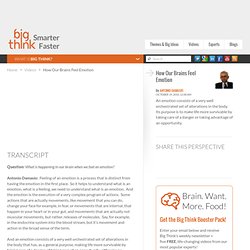
Antonio Damasio: Feeling of an emotion is a process that is distinct from having the emotion in the first place. So it helps to understand what is an emotion, what is a feeling, we need to understand what is an emotion. And the emotion is the execution of a very complex program of actions. Some actions that are actually movements, like movement that you can do, change your face for example, in fear, or movements that are internal, that happen in your heart or in your gut, and movements that are actually not muscular movements, but rather, releases of molecules. Your brain chemistry existed before animals did - life - 01 September 2011. WHEN wondering about the origins of our brain, don't look to Homo sapiens, chimpanzees, fish or even worms .

Many key components first appeared in single-celled organisms, long before animals, brains and even nerve cells existed. Dirk Fasshauer of the University of Lausanne, Switzerland, and colleagues were studying a pair of essential neural proteins called Munc18/syntaxin1 when they decided to look for them in very simple, single-celled organisms. THE BRAIN FROM TOP TO BOTTOM. Is Your Brain Liberal Or Conservative? The political differences between liberals and conservatives might run as deep as the brain, researchers suggest.
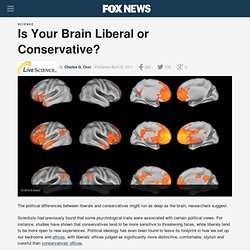
Scientists had previously found that some psychological traits were associated with certain political views. For instance, studies have shown that conservatives tend to be more sensitive to threatening faces, while liberals tend to be more open to new experiences. Political ideology has even been found to leave its footprint in how we set up our bedrooms and offices, with liberals' offices judged as significantly more distinctive, comfortable, stylish and colorful than conservatives' offices.
Cognitive neuroscientist Ryota Kanai of the University College London and his colleagues reasoned that such fundamental differences in personality might be seen in the brain. They scanned the brains of nearly 120 volunteers to investigate the idea. "Political attitude is often thought to be determined purely based on social context," Kanai told LiveScience. Inside the Brain: A Journey Through Time. Breakthrough: The first sound recordings based on reading people's minds.
SExpand For all of you thinking "it's tinfoil hat time"; you should know aluminum foil doesn't block anything...
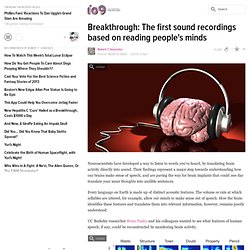
If you want to get the job done, choose a NATO SDIP-27 Level A (AMSG 720B) certified EMI shielding foil, and make your noggin a Faraday cage! A brief history of the brain - life - 26 September 2011. Read full article Continue reading page |1|2|3|4 New Scientist tracks the evolution of our brain from its origin in ancient seas to its dramatic expansion in one ape – and asks why it is now shrinking See gallery: Your brain's family album, from hydra to human IT IS 30,000 years ago.
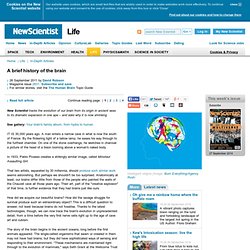
A man enters a narrow cave in what is now the south of France. In 1933, Pablo Picasso creates a strikingly similar image, called Minotaur Assaulting Girl. That two artists, separated by 30 millennia, should produce such similar work seems astonishing. Brain Atlas - Introduction. The central nervous system (CNS) consists of the brain and the spinal cord, immersed in the cerebrospinal fluid (CSF).
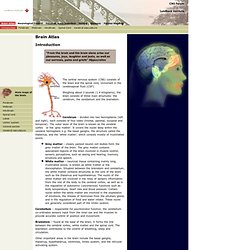
Weighing about 3 pounds (1.4 kilograms), the brain consists of three main structures: the cerebrum, the cerebellum and the brainstem. Cerebrum - divided into two hemispheres (left and right), each consists of four lobes (frontal, parietal, occipital and temporal). Brain is not fully mature until 30s and 40s. (PhysOrg.com) -- New research from the UK shows the brain continues to develop after childhood and puberty, and is not fully developed until people are well into their 30s and 40s.
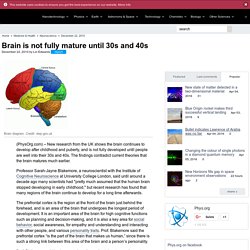
The findings contradict current theories that the brain matures much earlier. Professor Sarah-Jayne Blakemore, a neuroscientist with the Institute of Cognitive Neuroscience at University College London, said until around a decade ago many scientists had "pretty much assumed that the human brain stopped developing in early childhood," but recent research has found that many regions of the brain continue to develop for a long time afterwards. The prefrontal cortex is the region at the front of the brain just behind the forehead, and is an area of the brain that undergoes the longest period of development.
Prof. Blakemore said brain scans show the prefrontal cortex continues to change shape as people reach their 30s and up to their late 40s. Explore further: Study: Our brains compensate for aging. Human brains unlikely to evolve into a 'supermind' as price to pay would be too high. Public release date: 7-Dec-2011 [ Print | E-mail Share ] [ Close Window ] Contact: Anna Blackabya.blackaby@warwick.ac.uk 44-024-765-75910University of Warwick Human minds have hit an evolutionary "sweet spot" and - unlike computers - cannot continually get smarter without trade-offs elsewhere, according to research by the University of Warwick.

Researchers asked the question why we are not more intelligent than we are given the adaptive evolutionary process. Their conclusions show that you can have too much of a good thing when it comes to mental performance. The evidence suggests that for every gain in cognitive functions, for example better memory, increased attention or improved intelligence, there is a price to pay elsewhere - meaning a highly-evolved "supermind" is the stuff of science fiction. Similarly, drugs like Ritalan only help people with lower attention spans whereas people who don't have trouble focusing can actually perform worse when they take attention-enhancing drugs. The Brain—Information about the Brain. 1 Introduction “I think, therefore I am.”
